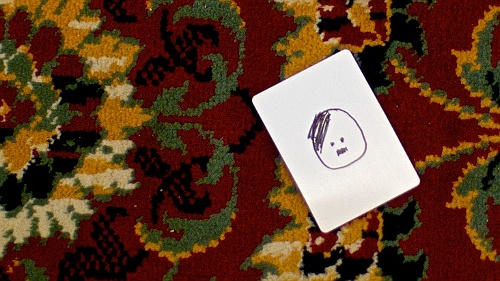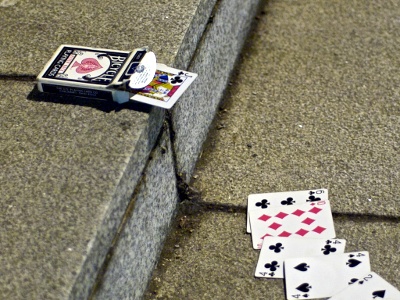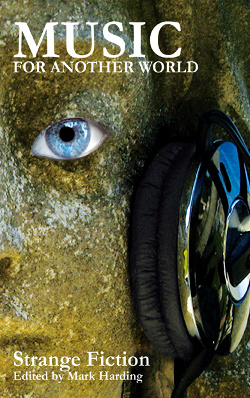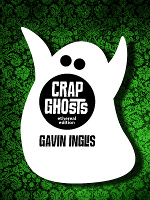Blog
The Death of Showbiz
1st March 2011
Old Blackpool attitudes meet an enlightened audience.I visited Blackpool recently for my first magic convention. I saw some amazing things: guys reading cards held behind their back, mental transmission of a date between two strangers from the audience, dancers producing seemingly endless packs of cards, and even a dodgy levitating couch. But the most amazing thing was entirely spontaneous.
Having registered very late, my seat for the Saturday night gala show was in the back row of the balcony; not too bad for somebody with an interest in magic, as you get the benefit of an often revealing overhead view. The guy in the next seat groused about how bad the compere had been last year.
When the new compere came out he reminded me a lot of Ted Bovis from Hi-De-Hi. He talked about celebrating 36 years in showbiz, that he lived in Tenerife now, and worked on the Queen Mary 2. He had a real flavour of the old Blackpool about him.

Of course I had a flavour of Blackpool already. The sky was grey for my entire visit, tram works blocked most access to the seafront, and my hotel featured earnest young performers knocking out tired old showtunes to a disinterested audience who got free drink between 7pm and 10pm.
The trouble was, for a guy who had been 36 years as a stand-up comedian, he wasn’t very funny. He cracked some weak jokes about the Welsh, the Scots and the Irish. Then he mimed a camp walk. He did a Larry Grayson impression. I don’t think Larry Grayson has been on TV for twenty years. It was pretty tedious. But he claimed kinship with the assembled audience of magicians because they were “in the business”.
What he failed to do was adapt to that audience, who were a younger breed than the ageing Northerners he was accustomed to, on the cruise ships he mentioned five or six times. For a while he got a lukewarm reaction, and general relief when he introduced the feature acts.
Then one guy in the balcony heckled him. He didn’t hear it, but he heard chuckles from the audience nearby. “What are they laughing at?” he asked. “Not you anyway,” yelled the heckler, and got a genuine laugh from the three thousand capacity hall.
Our host diverted into warm stories about Bernard Manning and a lecture on how he’d never “used language” in his career and how when he wanted to talk about “a certain subject — you know the one” he used the term “gardening”. Cue stories about husbands spending time on their allotments.
At this point, the heckler started a slow clap that spread across the balcony and down. I joined in with immediate delight. “Why are they clapping?” asked the puzzled compere, and when he worked it out, he was furious.
“I’ve never witnessed anything so disgusting in my life,” he said. “And you’re supposed to be in the business. You should be ashamed of yourself.” He was sufficiently passionate about respecting other performers that I felt guilty for joining in. “I’ve been in this business for 36 years and you will not shake me.” He got applause from scattered sections of the audience.
Five minutes later, he had passed through “I don’t have anything against gay gentlemen but (shiver) it’s not for me … yeuchh.” Now he was talking about women wearing bikinis without shaving their pubic hair first. He referred to it as “trimming the lawn”. The slow clap started again and this time most of the room joined in. He took offence again and determined to only introduce the acts, with no further comedy. But he never came back.
Later there was talk in the pub of whether we were out of line. But I felt fine. His material was racist, sexist and homophobic. He was performing to an audience from around the UK, with many women and gay people. He’d probably been using the same set for 36 years without bothering to update or adapt it. I enjoyed him as a dated, clichéd, colourful local character. But I really enjoyed watching three thousand people reject him.
Magic on TV
9th January 2011
Deep content vs. celebrity content.This week was good for TV magic with the debut of The Magicians on BBC and Penn and Teller: Fool Us on ITV. There could hardly have been more of a contrast.

I’ve never been a great fan of Penn & Teller because of the shock value in their act — I like my magic with more elegant mystery and less fake blood. But they were great on this show.
Never mind the trick where they made some poor girl’s phone disappear and it turned up inside a dead fish in a sealed box — although, that was great. And never mind their gory misdemonstration of sawing a woman in half. What I liked about them this weekend was their good-natured professionalism.
The concept of the show was that working magicians got the chance to fool them with a trick and if they did, they got a trip to Vegas to appear on the P&T show. I won’t spoil the programme for you in case you want to catch it online, but they on the whole found a way to communicate the method when they rumbled it, without exposing too much. One sad truth about magic is that the “secret” is often rather uninteresting compared to the staggering effect. P&T also treated the contenders with a politeness that I didn’t expect — and genuinely seemed to want to be fooled.
Having said that, my absolutely favourite moment was the giant figure of Penn yelling in honest frustration, “We didn’t come here to be fooled by some retired policeman and his five envelopes!”.
Over on the Beeb I caught up with The Magicians. I could almost hear the voices from the production meeting. “But you know, we don’t want it to be boring like Paul Daniels. So let’s put in some celebrities who have to learn magic. Yeah! And we have to have someone booted out like in Big Brother or The Apprentice. So we’ll have a forfeit. Brilliant. Right, shoot it.”
I can’t tell you what the forfeit was. I turned it off after twenty minutes. I just couldn’t be bothered waiting through more dance groups and celebrity profiles. I felt sorry for Lenny Henry — who I rather like — stuck on the front of this tedious show. I switched instead to his stand-up set at the Apollo in London which showed him on top form.
It comes down to production choices. ITV let proven performers do their thing without interruption and added a little glimpse behind the curtain as a tease. The BBC didn’t trust their magicians to carry the show and added the kind of content you can see on any filler show.
Guess which of these programmes is the first of a series, and which is a one-off? :(
Not Quite The Best Little Whorehouse
29th October 2010
Over-analysing the dramatic structure of a whimsical musical.This post contains spoilers about the plot of The Best Little Whorehouse in Texas. That might not seem like a big deal but some people take musicals very seriously.

Last night Andrew C Ferguson and I went to see a mutual friend perform in The Best Little Whorehouse in Texas. Although I hate gingham I do quite like musicals and indeed it was a fun and well-staged show with some great one-liners. Structurally however, the story is a disaster.
The first act is totally fine. Here's the key points:
- Two new girls come to work at Miss Mona’s cathouse, a “l’il ol’ bitty pissant country place.”
- Miss Mona is a shotgun-toting tough-but-fair dame with a heart of gold who cares for her girls and strives for a classy operation.
- A slimy crusading TV presenter called Melvin P. Thorpe stirs up locals and tries to get the place closed down.
- The sheriff, Ed Earl Dodd, who has always supported Miss Mona, boots Melvin out of town and is pictured on TV using foul language.
- The Governor gets involved.
- Melvin raids the whorehouse, catching both the local football team and a senator in the act.
So far so good. What we know is: Miss Mona and her girls are providing a fair service under decent conditions and are generally happy.
This is what we need from the concluding act:
- Miss Mona’s gets shut down.
- There are a couple of unhappy songs.
- A far greater danger threatens the town.
- The cathouse girls are the only people who can save it.
- They do so at great personal cost.
- The grateful townspeople see the error of their ways, accept the girls and Miss Mona’s reopens.
- Melvin tries to stir up more trouble and gets seriously booted out of town by its entire population.
- The lonely sheriff and Miss Mona get together.
- We close with a spectacular song and dance number called The Best Little Whorehouse In Texas.
- The End.
What instead we get is this:
- The Governor refuses to take a position on whether the cathouse should be closed.
- The sheriff opines that Miss Mona is a “good ol’ girl”.
- The Governor bows to public pressure and orders the closing of Miss Mona’s.
- The sheriff phones to warn Miss Mona he will be coming to shut her down.
- The girls pack up and sing a sad song about what they will do with their lives.
- Miss Mona, last to leave, looks around the place and sings a sad song.
- The End.
What? What a total bummer of a second act.
Yes there are some subtleties I have not captured like the fact that the waitress at the café fantasises about being a sexy creature herself or that the sheriff doesn’t remember their trip to Galveston the way Miss Mona does, but come on, we need more. Otherwise this is the plot:
- There is a good thing.
- Someone tries to spoil it.
- It gets spoiled.
- The End.
Not the emotional experience I want from my musicals. No matter how much fishnet and silk they feature.
* I am aware that the sex trade is in reality often exploitative and that most sex workers do not regularly stop what they are doing and break into a cheerful song.
Introduction to Psychogeography
3rd October 2010
Getting lost with purpose.Yesterday I had my first experience of psychogeography, going on a dérive with the rather more experienced Barbara Melville. The subject has been tapping on my consciousness for a while. It appeals on a number of levels: a fascination with odd maps; normal writer’s nosiness; a tendency to perceive the environment and communicate in a spatial way; and a general interest in any long word which consists of two others rammed together.
Getting a precise definition of psychogeography is a quest in itself. It seems to have originated with the French Situationists. I’ve heard diverse accounts of their intentions. On one hand they were interested in the psychological effects that cities had on their inhabitants. By seeking to understand them through investigation and direct experience, they hoped to come to some greater comprehension of environmental factors and urban planning, and perhaps make recommendations which would shape the design of the cities of the future.
On the other hand they were interested in getting crazy drunk and going out to look for hookers.

One of the great things about psychogeography is that you can pretty much do what you want, and in fact it’s a mistake to plan it too much. On Saturday we went in search of an open-air theatre and ended up exploring areas of domestic affluence sliced through by major roads and parkland leading out of the city. What sticks with me are the details: striking contrasts between original buildings and “harmonious” redevelopment; friendly versus unfriendly suburbs; a bus that never arrived; a carefully arranged rectangle of trees; and a strange stash concealed down a path that seemed to have an exaggerated importance.
Some part of me wants to be hardcore about this stuff, deliberately visiting areas which feel threatening, or keeping a rigid focus on one terribly specific aspect of the environment. But perhaps that would be missing the point.
You will be hearing more about this for sure.
Music For Another World
21st August 2010
A new anthology hits the high notes.
Just had the pleasure of bumping into Sean Martin at the Book Festival, a fellow contributor to the new Mutation Press anthology Music For Another World.
There’s a lot to like about this anthology. The concept — speculative fiction on the theme of music — has prompted a lot of gnashing teeth online from people who wished they’d thought of it first. The editor, Mark Harding, was swamped with submissions, and indeed both successful and unsuccessful contributors seem to have cared a lot about being included — out of proportion to the resulting cheque or exposure.
What is it about music that motivates writers? Honestly? I think it’s jealousy. One of the first things I ask students is, why write fiction at all? and once we dispense with money and fame, a quiet voice from the back normally ventures that we want to move our readers. That’s true, and it normally requires a painstaking procedure of introducing our characters to the reader, making said characters likeable, and eventually putting them through the wringer one way or another.
Whereas musicians get to hit the heart immediately. Whether it be a boys’ choir on a winter evening, an old chart tune with associations, a lonely cello or a big fat power chord, they get right in there. If you don’t believe me, try watching your favourite adventure, weepy or horror film without the soundtrack.
Perhaps the best thing about Music For Another World is not the terrific stories inside, but the intention behind it. Mark Harding has put together the book he wanted, a collection “wildly variable in tone, genre, subject matter and approach”. This is what weary publishers always tell you that readers don’t want and will never buy. Feel like proving them wrong?
